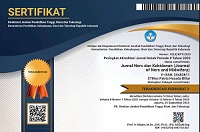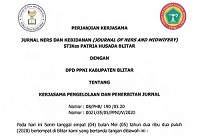The Level of Knowledge, Motivation, and Self Efficacy of Post-Stroke Patients in Lumajang
DOI:
https://doi.org/10.26699/jnk.v8i2.ART.p201-205Keywords:
knowledge, motivation, self-efficacy, post-strokeAbstract
Post-stroke conditions can be stressful and unpredictable. Knowledge, motivation, and self-efficacy are essential to the long-term care of post-stroke patients. This study aimed to analyze the correlation between the level of knowledge, motivation, and self-efficacy of post-stroke patients in Lumajang. This study used a cross-sectional design. The population of this study was post-stroke patients in Lumajang. The sampling technique used consecutive sampling with the number of samples obtained, namely 55 samples. The variables of this study were the level of knowledge, motivation, and self-efficacy. The data collection was carried out by using a questionnaire. The data analysis was performed by using the Spearman Rank test. The results showed a correlation between knowledge and motivation with self-efficacy in post-stroke patients, with p-values of 0.004 (r: 0.383) and 0.000 (r: 0.581). A person who had high knowledge and motivation would show positive results in managing his disease; for example, in the stroke concept, the patient will actively participate in the rehabilitation program, treatment program, and schedule visits to health care facilities.References
Arianti, Y., Sitorus, R., & Gayatri, D. (2012). Motivasi dan Efikasi Diri Pasien Diabetes Mellitus Tipe 2 dalam asuhan Keperawatan. Jurnal Keperawatan Indonesia, 29-38.
Bandura, A. (1997). Self-efficacy: The excercise of control. New York: W.H Freeman and Company.
Bethesda Stroke Center. (2012). Pengetahuan Sekilas tentang Stroke. Retrieved from http://www.strokebethesda.com.
Budi, H., Bahar, I., & Sasmita, H. (2020). Faktor Risiko Stroke pada Usia Produktif di Rumah Sakit Stroke Nasional (RSSN) Bukit Tinggi. Jurnal PPNI, 129-140.
Dharma, K. K., & Rahayu, H. (2021). The effective post-stroke adaptation behavior model requires a family support system. EnfermerÃa ClÃnica.
Donsu, J. D. (2017). Psikologi Keperawatan. Yogyakarta: Pustaka Baru Press.
Faiz, K. W., Labberton, A. S., Thommessen, B., Rønning, O. M., & Barra, M. (2019). Stroke-Related Knowledge and Lifestyle Behavior among Stroke Survivors. Journal of Stroke and Cerebrovascular Diseases, 1-7.
Irvan, R. Z., Nuraini, T., & Gayatri, D. (2021). The link between self-efficacy and mobility performance in stroke patients. EnfermerÃa ClÃnica, S316-S320.
Kristiyawati, S., Irawaty, D., & Hariyati, R. (2009). Faktor Risiko yang Berhubungan de-ngan Kejadian Stroke di RS Panti Wilasa Citarum Semarang. Jurnal Keperawatan dan Kebidanan (JIKK), 1-7.
Lestari, N. (2010). Pengaruh Massage dengan Minyak Kelapa terhadap Pencegahan Dekubitus pada Pasien Stroke di Rumah Sakit Pusat Angkatan Darat Gatot Subroto Jakarta Pusat. Jakarta: Universitas Pembangunan Nasional.
Noor, N. (2008). Epidemiologi Edisi Revisi. Jakarta: Rineka Citra.
Pasaribu, D., & Tedjasukmana, R. (2018). Faktor-Faktor yang Memengaruhi Pengetahuan Masyarakat tentang Stroke di RT 010 RW 03 Kelurahan Tanjung Duren Selatan Jakarta Barat. Jurnal Kedokteran Meditek.
Pratama, B. D., & Widodo, A. (2017). Hubungan pengetahuan dengan efikasi diri pada caregiver keluarga pasien gangguan jiwa di RSJD Dr. RM. Soedjarwadi. Jurnal Kesehatan, 13-22.
Price, S., & Wilson, L. (2006). PATOFISIOLOGI : Konsep Klinis Proses - Proses Penyakit. Jakarta: Penerbit Buku Kedokteran : EGC.
Robinson-Smith, G., & Pizzi, E. R. (2003). Maximizing stroke recovery using patient self-care self-efficacy. Rehabilitation Nursing, 48-51.
Sarkar, A., Sarmah, D., Datta, A., kaur, H., Jagtap, P., Raut, S., . . . Bhattacharya, P. (2021). Post-stroke depression: Chaos to exposition. Brain Research Bulletin, 74-88.
Stanley, M., & Pollard, D. (2014). Relationship Between Knowledge, Attitudes and Self-Efficacy of Nurses in Management of Pediatric Pain : Pediatric Nursing Knowledge and Attitude Survey Regarding Pain. Journal Publish US National Library of Medicine National Institutes of Health.
Taufik, M. (2010). Asal-usul pengetahuan dan hakekat pengetahuan. Bogor: Institut Pertanian Bogor.
Volz, M., Möbus, J., Letsch, C., & Werheid, K. (2016). The influence of early depressive symptoms, social support anddecreasing self-efficacy on depression 6 months post-stroke. Journal of Affective Disordershttp://dx.doi.org/10.1016/j.jad.2016.07.0410165-0327/&2016
Zakeri, A., Rahmany, R., & Labone, E. (2016). Teachers’ Self- and Collective Efficacy: The case of Novice English Language Teachers. Journal of Language Teaching and Research.
Downloads
Published
How to Cite
Issue
Section
License
Copyright (c) 2021 Jurnal Ners dan Kebidanan (Journal of Ners and Midwifery)

This work is licensed under a Creative Commons Attribution-ShareAlike 4.0 International License.






